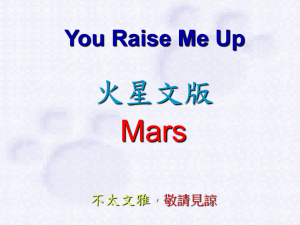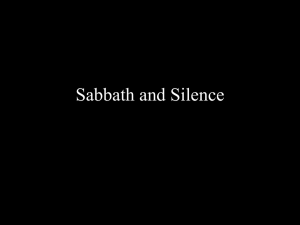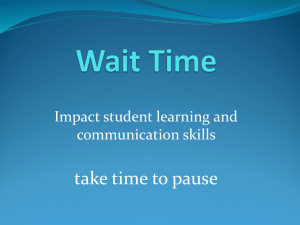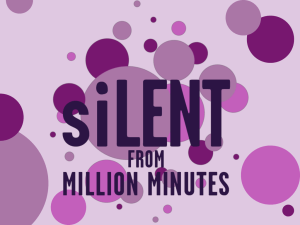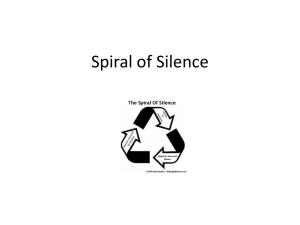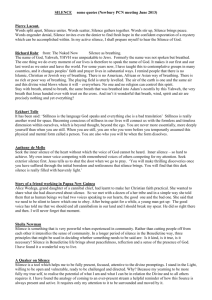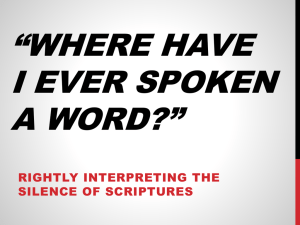Microsoft PowerPoint - the NCRM EPrints Repository
advertisement
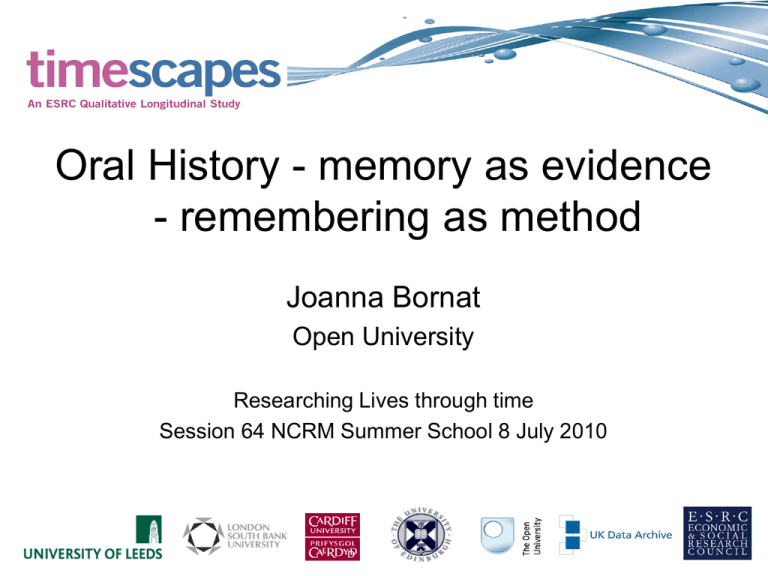
Oral History - memory as evidence - remembering as method Joanna Bornat Open University Researching Lives through time Session 64 NCRM Summer School 8 July 2010 Continuity and innovation • • Continuity – Historical research and search for evidence - eclectic in terms of sources – Linking with contemporary trends - labour, women’s history, – Developing from ethnography of US Chicago School Change – Multidisciplinary in approach – Subjectivity recognised – Questioning the suzerainty of the document – Memory as more than a source – The interview - a social interaction – The data - dialogical A social movement? ‘Oral history is a history built around people. It thrusts life into history itself and it widens its scope. It allows heroes not just from leaders, but from the unkown majority of the people. It encourages teachers and students to become fellow-workers. It brings history into, and out of, the community. It helps the less privileged, and especiallly the old, towards dignity and self-confidence. It makes for contact - and thence understanding - between social classes and between generations. And to individual historians and others, with shared meanings, it can give a sense of belonging to a place or in time. In short, it makes for fuller human beings. Equally, oral history offers a challenge to the accepted myths of history, to the authoritarian judgement inherent in its tradition. It provides a means for a radical transformation of the social meaning of history’. Thompson, P (1988) The Voice of the Past, second edition, Oxford, Oxford University Press, p. 21 Beginnings in the UK • End of 1960s/1970s - an organisation, Oral History Society and a journal Oral History. • Engaging with: historians, social scientists, anthropologists, folklorists, archivists, BBC, museums, dialect studies. • Boosted by funding from (then) SSRC Peer recognition and a model for future work Thompson’s Essex University Department of Sociology interview survey of Family Life and Work Experience before 1918. (SSRC funded 1970) Key features: Quota sample - based on 1911 Census 500 interviews recorded Age based - all born before 1905 2-3 interviews per person - 3+ hour interviews Interview schedule - occupations, domestic routine, meals, relationships with parents, punishments, family activities and leisure, neighbouring and the community, religion, politics, education, work and marriage. All transcribed and deposited in British Archive of Recorded Sound. News item in Oral History, vol 1, p. 5. (These oral history interviews are now also digitally available at Qualidata: http://www.esds.ac.uk/qualidata/) Engaging with critics Oral History’s empiricism,individual reductionism, objectification of the past and neglect of power relations in the interview. Popular Memory Group at the Centre for Contemporary Studies, University of Birmingham (1982) Response - linking UK oral history making to French and Italian oral historians, particularly Sandro Portelli and Luisa Passerini - distinguished by focus on oral history as: considering what is ‘silent’ or forgotten valuing the oral role of imagination, the symbolic and desire means to understanding subjectivity Reference: Perks, R & Thomson, A, eds, (2006) The Oral History Reader, London, Routledge, 2nd Edition. Silence and forgetting ‘…silence and forgetting are often confused if memory is analysed as narration be it oral or written. Something may be unsaid because its memory has been actually repressed - by trauma -…or because the conditions for its expression no longer (or do not yet exist). Sometimes the change in these conditions may break the silence…at other times silence can last for so long …that it may …induce oblivion. At the same time…silence may nourish a story and establish a communication to be patiently saved…until it is able to come to light in a new and enriched form’. Passerini, L (2003) ‘Memories between silence and forgetting’, in K. Hodgkin & S Radstone (eds) Contested Pasts: the politics of memory, London: Routledge, p. 238 Silence or forgetting? ‘…early years I had one or two experiences where people rejected, people doesn’t want …to be treated by me. I used to feel that…is that because of my colour, is thst the way I’m looking? But when you are really look in depth it’s only hindsight I can say that. One I didn’t understand their culture. Second, I wasn’t understanding what they’re saying. Thirdly they weren’t understanding what I am saying. These things are important fact in life. They must have all contributed to this problem. And thirdly I was a training doctor; I wasn’t even a full fledged doctor to stand firmly and confidently and talk to the patients. So there were traumatic days’. Bornat, J, Henry Raghuram, P (2009) ‘”Don’t mix race with the specialty”: interviewing South Asian overseas trained geriatricians’, Oral History, 37/1(74-84) Imagination and the symbolic ‘…Oral history is basically the process of creating relationships between narrators and narratees, between events in the past and dialogic narratives in the present. The historian must work on both the factual and the narrative planes, the referent and the signifier, the past and the present, and, most of all, on the space between all of them.’ Portelli, A (2003) The order has been carried out: history, memory and meaning of a Nazi massacre in Rome, Basingstoke, Palgrave Macmillan, p.15 Imagination and the symbolic As I say mother never went to school a day in her life, we attended Church of England.But there was another lady that lived not far away, but not in the same road. She was a very nice lady and sometimes I used to shop for her. And she said to me one day, she said, Nellie, I have a ticket for the Messiah and I can't go, would you like to go with it? And I don't know that I'd ever heard the word Messiah then although I knew the Church of England story about Jesus being crucified and all that. I don't think I'd heard the word Messiah before then. And I went alone that night and - we'd a very good choral society in the village at that time - and I heard the Messiah that night, the first time I'd ever heard it. And how old would you be then? Well I shouldn't be above 11 or 12 You went on your own or I went on my own absolutely. And I shall never forget it. And I could cry now when I think how I was touched with ' He was despised and rejected' Very beautiful isn't it? Because many a time I felt that I was despised especially with me mother and father not living together, you know. I never hear it now but what I think about that. Bornat, J (forthcoming) ‘Remembering and reworking emotions: the reanalysis of emotions in an interview’, Oral History. Subjectivities ‘...be reminded of the importance of the narrators’ own self-definitions as they talked about their lives, in contrast to definitions imposed by interpreters of personal narratives and by the narrators’ own society. The importance of the political and institutional contexts of both the narrator and the interpreter of a personal narrative became increasingly obvious.’ Personal Narratives Group (1989) Interpreting Women’s Lives: Feminist Theory and Personal Narratives, Bloomington, University of Indiana Press, p 12. Subjectivities ‘There is an entry in my diary dated April 26, and I don’t know if I wrote it before or after the interview. It is the long entry about objectivity and respecting my informants and their political positions notwithstanding my disagreements with them. I suspecti it may have been inspired by the way Y touched me with her honesty and her pain, and also with her gently worded, but seemingly uncompromising, plea that their cause was an essential life force for her; her family, and her people’. Hamilton, C (2008) ‘On being a “good” interviewer: empathy, ethics and the politics of oral history’, Oral History, 36/2, p.37-8 Ownership and ethics ‘…the greatest need is for projects that take seriously the task of involving people in exploring what it means to remember, and what to do with memories to make them active and alive, as opposed to mere objects of collection and classification’. Frisch, M (1990) A Shared Authority: essays on the Craft and Meaning of Oral and Public History, New York, SUNY, p. 188 Oral history - the new populism? ‘That is one of oral history’s implicit ambitions: using a populist style to tell populist history. The oral historian does little more than hold up a mirror, just making sure the glass is clean. The practice claims to be self-effacing and world-revealing. How can a collection of interviews be anything else?’ Edward Rothenstein quoted by Michael Frisch (2009) in ‘Studs Terkel, Historian, History Workshop Journal, 69, Spring, p. 191 A response ‘…community oral history projects, just like research community studies, can give us rare windows into social worlds whose significance has been too long neglected…we believe that through the current separation of research and volunteer-based community studies we are missing important chances of contributing to current debates of major issues about the nature of community…why, for example, some are much more successful than others in class or ethnic mixing…we need to develop both a means for sharing oral history material collected and a forum for debating issues: ideally both face to face and through the internet…’. Thompson, P & Corti, B (2008) ‘Whose community: the shaping of collective memory in a volunteer projet, Oral History, 36/2, p. 196 An oral history for C21? • • • • • ‘More’ or ‘anti’ history - still the challenge? Radical claims of oral history - child of the Sixties generation? Oral history’s new universalism - triumph or problem? Do we need new narratives for a new(ish) century? Oral history developed with the portable recording machine - what challenges and opportunities do the forms and formats of the digital age present? Oral History Society: http://www.ohs.org.uk/ International Oral History Association: http://www.iohanet.org/
